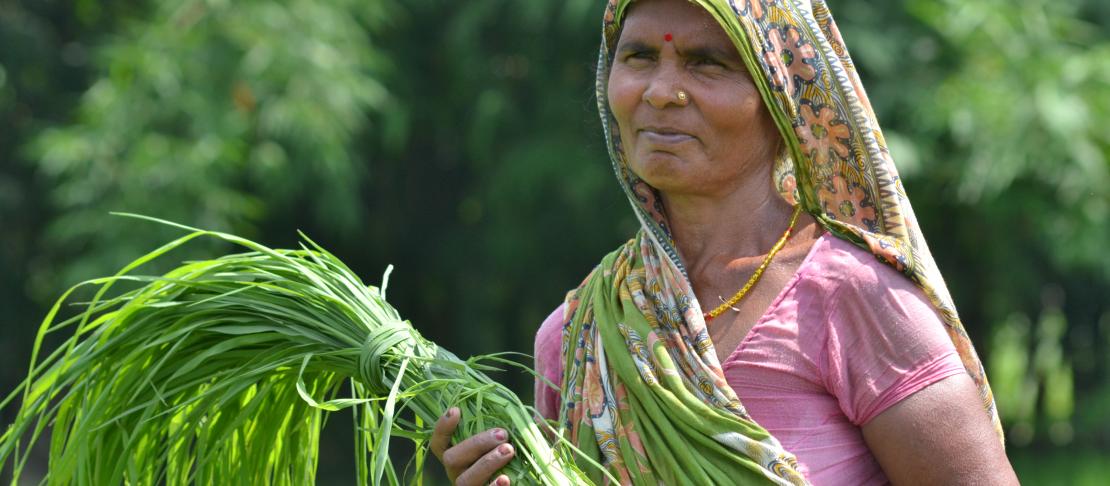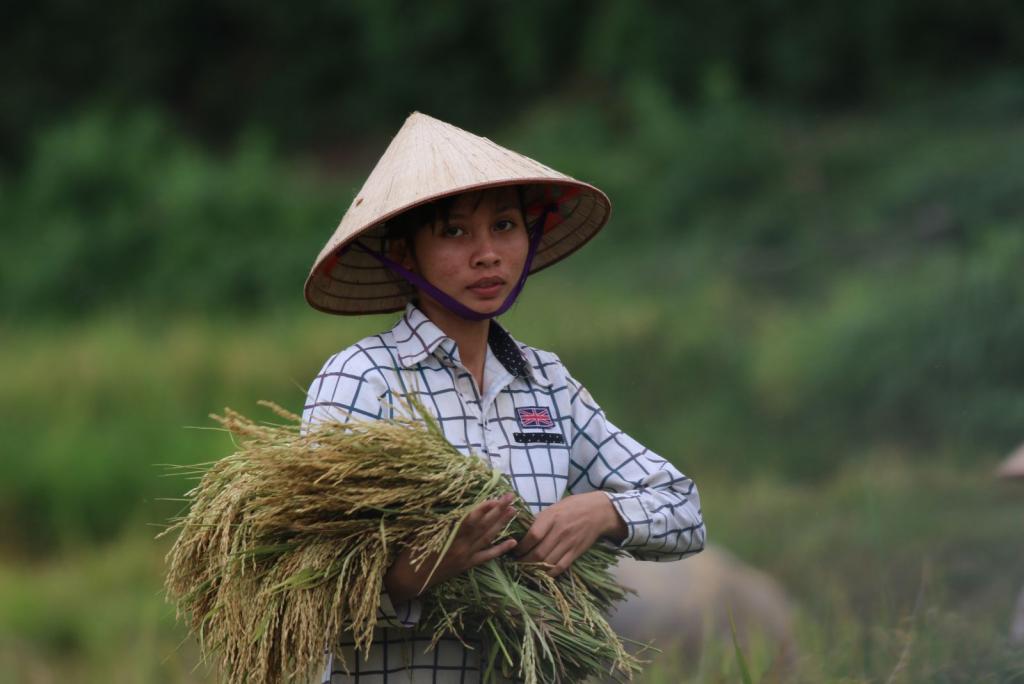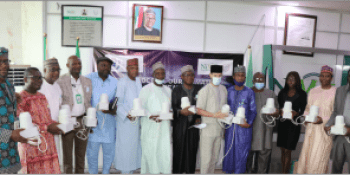Researchers support women as they #PressForProgress this International Women’s Day

In celebration of International Women’s Day, researchers share how their work supports women farmers, continuing the push for gender equality.
International Women’s Day (IWD), celebrated annually on March 8, recognizes the contributions of women and calls for a continued push for gender equality. For women farmers, the theme of this year’s IWD, #PressForProgress, is especially relevant. Not only do women make up a substantial portion of the global agriculture workforce, but gender inequities mean that women often receive lower pay, are less likely to own land, and have less access to agricultural innovations and information compared to men.
Building off of CCAFS' theme for the International Day of Women and Girls in Science, we continue to interview scientists and researchers who work with women farmers to learn how research can help women build a better future.
Researchers sharing their work include:
- Dr. Leocadio Sebastian, Regional Program Leader, International Rice Research Institute (IRRI)
- Dr. Bruce Campbell, Program Director, CGIAR Research Program on Climate Change, Agriculture and Food Security (CCAFS)
- Nitya Chanana, Research Consultant, International Maize and Wheat Improvement Center (CIMMYT)
How does your research/work help women farmers?
Dr. Leocadio Sebastian (LS): In Southeast Asia, women play significant roles in agriculture, particularly in rice production, as paid and unpaid workers. Women are also affected by the negative effects of extreme climate variability. This makes them important stakeholders in CCAFS’ research activities. Our studies reveal that they have less access to climate-smart technologies, training, and information compared to men. Our research focuses on how we can help reduce women’s drudgery in rice production, provide women access to climate information, and engage them in community-based climate-smart technologies and practices. For example, our project, “Using Agro-Climate Information to Enhance the Adaptive Capacity of Women and Ethnic Minority Smallholders” in Vietnam, Cambodia and Lao PDR, has a strong gender-focus and will closely monitor climate information in terms of acceptability to men and women. We also promote climate-smart rice varieties, such as improved salt-tolerant rice varieties, to reduce replanting, a task which is relegated to poor women. We help empower women with technical knowledge through training, demonstration trials, and participatory community-based activities like backyard swine production using local materials for feed ration.
Nitya Chanana (NC): Our research is directed towards the economic and social empowerment of women farmers in the wake of climate change. Specifically, our projects aim to improve their resilience to climate change in agricultural as well as socio-economic domains. Through our research and implementation of climate-smart agriculture (CSA) technologies and practices in South Asia, we strive to address their needs and constraints related to information, labor, and decision making. For example, solar irrigation in rainfed parts of Nepal, through women-led solar cooperatives, has not only led to higher incomes and crop productivity for the women farmers, but also improved decision-making and social empowerment. Similarly, promotion of CSA technologies and practices through village committees in Madhya Pradesh has given women an opportunity to voice their concerns and opinions on the use and control of these technologies for climate resilience.
How do you see the gender-integrated, gender-specific research of CCAFS, as well as that of any other CGIAR Research Program (CRP), contributing to this year's IWD theme?
LS: Women in Southeast Asia are significant players in the development of the region. They play a dominant role in private and government sectors in different countries in the region. As such, gender is mainstreamed in CRP research, and many of the important research activities that address food security and nutrition issues are led by women as well.
Dr. Bruce Campbell (BC): We will use IWD to #PressForProgress with all our project participants, indicating we want all participants to make an extra effort to reduce gender gaps in line with the global ambitions, with a stock take on what was achieved by CCAFS at year end.
NC: Most of our gender-integrated project activities are actually trying to “press for progress.” We work in multiple districts across India where socio-cultural norms prohibit women farmers from actively taking part in interventions. However, through numerous capacity building and training exercises, we encourage women to participate and help them understand their role in the project activities. In some districts, such as Madhya Pradesh, Uttar Pradesh and Bihar, we promote CSA activities through women-led groups. The group-based approach is known to be a powerful tool to empower rural women. Our gender-specific research for development also strives to achieve gender parity across research objectives. For instance, a project in Nepal is aiming to influence, or “press,” policymakers to incorporate gender issues into key climate change and agricultural policies. Across our research CRP’s we are making a conscious effort to promote a gender-parity mindset while defining our outcomes and impacts.

Woman farmer harvesting rice in Xã Mỹ Thuận in northern Vietnam. Photo: Leo Sebastian (CCAFS Southeast Asia)
What are the key opportunities for gender research to achieve more impact?
LS: Gender research should always take context into account. The diversity of agro-climatic, socio-cultural, and economic conditions should always be a primary consideration. Achieving greater impact in Southeast Asia would require research for development (R4D) to reduce women’s burden in most field and household activities and empower them with managerial skills and technical knowledge. With increasing male out-migration to cities, women are becoming the de facto heads of households and farm managers. They need to upgrade their knowledge and skills as well as have access to income opportunities within their villages. Gender research should also be mainstreamed in R4D and not just be treated as part of a checklist. We need to show more examples of how gender research has made a difference in the lives of poor women, particularly those who live in vulnerable areas.
BC: In terms of climate change, the key opportunity is empowering women with information to make decisions in an increasingly variable and challenging climate. Information is a key part of building adaptive capacity. Our particular focus will be on climate forecasts, both seasonal and 10-day forecasts, and the associated agricultural information to make decisions about farming operations, such as what to plant, when to plant, and when to fertilize. Women have different means of accessing information than men, so this research involves improving forecasting, the content of the information, and the means of communicating.
NC: We see great opportunity in participatory research to test the feasibility and gender responsiveness of various CSA practices, including information and communication technologies and crop insurance. This still seems to be a grey area that, if researched, can further provide great insights for policy as well as local project implementation. Additionally, making use of big data to highlight prevailing socio-economic conditions and trends can augment the gender research portfolio to a considerable extent.
Read more:
- Info Note: Achieving Gender Equality and Women’s Empowerment in Smallholder Adaptation: Lessons from IFAD’s Adaptation in Smallholder Agriculture Programme
- Blog: Commemorating International Women’s Day by highlighting the role of women in climate change adaptation in 2017
- Blog: International Women’s Day 2016: Spotlight on women taking action on climate change in agriculture
Kathlee Freeman is a communications consultant with the CGIAR Research Program on Climate Change, Agriculture and Food Security (CCAFS).



